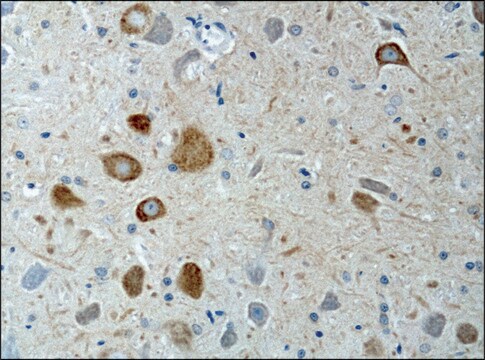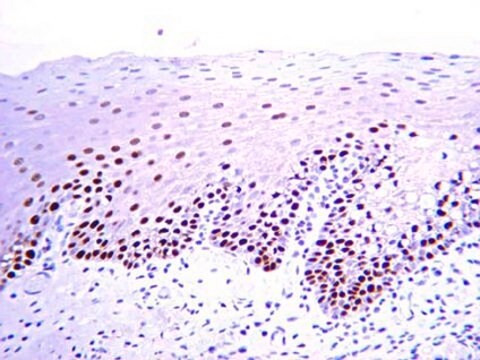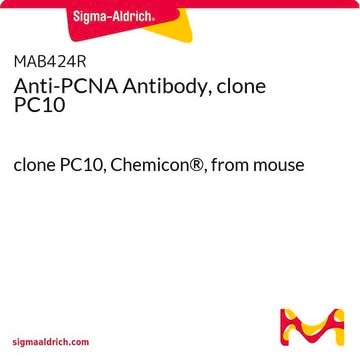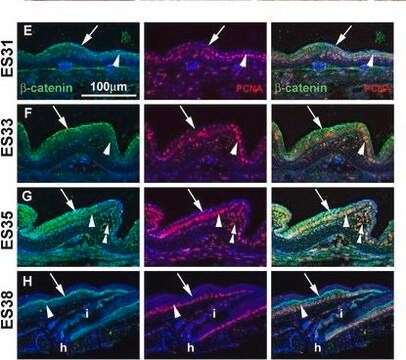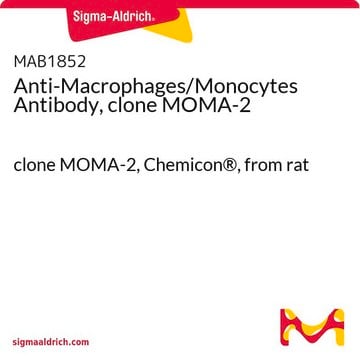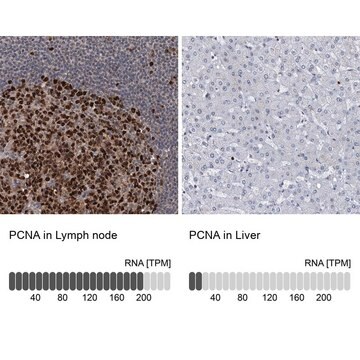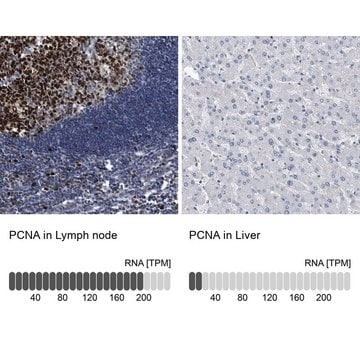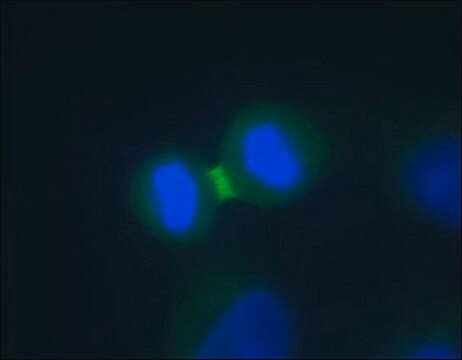일반 설명
Monoclonal Anti-Proliferating Cell Nuclear Antigen (mouse IgG2a isotype) is derived from the PC 10 hybridoma produced by the fusion of mouse myeloma cells and splenocytes from a BALB/c mouse immunized with PCNA-Protein A fusion protein. Proliferating cell nuclear antigen (PCNA, 36 kDa), also known as cyclin, is an auxiliary protein of DNA polymerase. The protein is present in the nucleoplasm of continually cycling cells throughout the cell cycle.
PCNA (proliferating cell nuclear antigen) is a member of the structurally and functionally conserved family of DNA sliding clamps (β clamps). They exist as ring-shaped complexes- homotrimers in eukaryotes, having pseudohexameric symmetry. A monomer of PCNA is composed of two similar globular domains, connected by an interdomain connecting loop, which is a long, and probably a flexible loop. These monomers organize themselves in a head-to-tail manner to form a ring, which has an inner positively charged surface composed of α helices and an outer surface of β sheets.
특이성
Recognizes the acidic, non-histone, auxiliary protein of DNA polymerase, PCNA, also known as polymerase delta accessory protein. Fixation duration can markedly affect the intensity of PCNA immunoreactivity. However, delay in fixation does not affect the immunoreactivity. Enzymatic treatment destroys staining. In immunocytochemical labeling of acetone-methanol, or methanol-fixed cells, the antibody shows granular staining throughout the nucleus (nucleolus and nucleoplasm). Specific staining is observed in proliferating cell nuclei, particularly in germinal centers, of a wide range of normal and malignant tissues.
면역원
PCNA-Protein A fusion protein
애플리케이션
Monoclonal Anti-Proliferating Cell Nuclear Antigen antibody produced in mouse has been used for immunohistochemistry (IHC) Western blotting (WB).
Monoclonal Anti-Proliferating Cell Nuclear Antigen antibody produced in mouse has been used in:
- enzyme linked immuno sorbent assay (ELISA)
- immunoblotting
- immunohistology
- immunoprecipitation
- flow cytometry
생화학적/생리학적 작용
PCNA (proliferating cell nuclear antigen) is loaded around the template-primer 3′ ends, which is recognized by the conserved chaperone-like complex RFC (replication factor C), and this mechanism is ATP-dependent. Encircling of the DNA by the PCNA ring ensures firm anchoring of the polymerases to the DNA, and hence, functions as a co-factor for DNA polymerases. Post-translation modifications of this protein at the K164 residue is required for the regulation of DNA damage tolerance (DDT) pathways, pathways that ensure recovery from replication arrest at DNA lesions.
Proliferating cell nuclear antigen (PCNA) is essential for DNA replication during S-phase. It is essential for cellular DNA synthesis. PCNA is required for leading strand synthesis in the SV40 system where it acts as an auxiliary protein for polymerase.
면책조항
Unless otherwise stated in our catalog or other company documentation accompanying the product(s), our products are intended for research use only and are not to be used for any other purpose, which includes but is not limited to, unauthorized commercial uses, in vitro diagnostic uses, ex vivo or in vivo therapeutic uses or any type of consumption or application to humans or animals.
